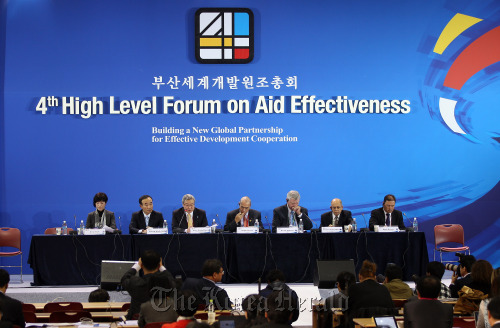BRIC nations’ agreement at the Busan aid forum to join a new global development partnership is a significant breakthrough, sources said.
While advanced countries have had difficulty expanding or maintaining their budgets for international aid due to the recent global economic downturn, the increased role of Brazil, Russia, India and China at the Fourth High Level Forum on Aid Effectiveness may point to a new era.
These emerging countries struggled to draft a final version of the document with more traditional donor countries until the evening before the outcome document was finalized. Of particular difficulty was how to define South-South cooperation and what kind of role it can play in relation with North-South cooperation, they said.
South-South cooperation refers to political, economic and technical cooperation among developing countries.
“The nature, modalities and responsibilities that apply to South-South cooperation differ from those that apply to North-South cooperation. At the same time, we recognize that we are all part of a development agenda in which we participate on the basis of common goals and shared principles,” the outcome document of the Busan Partnership for Effective Development Cooperation said.
While advanced countries have had difficulty expanding or maintaining their budgets for international aid due to the recent global economic downturn, the increased role of Brazil, Russia, India and China at the Fourth High Level Forum on Aid Effectiveness may point to a new era.
These emerging countries struggled to draft a final version of the document with more traditional donor countries until the evening before the outcome document was finalized. Of particular difficulty was how to define South-South cooperation and what kind of role it can play in relation with North-South cooperation, they said.
South-South cooperation refers to political, economic and technical cooperation among developing countries.
“The nature, modalities and responsibilities that apply to South-South cooperation differ from those that apply to North-South cooperation. At the same time, we recognize that we are all part of a development agenda in which we participate on the basis of common goals and shared principles,” the outcome document of the Busan Partnership for Effective Development Cooperation said.

“In this context, we encourage increased efforts to support effective co-operation based on our specific country situations. The principles, commitments and actions agreed in the outcome document in Busan shall be the reference for South-South partners on a voluntary basis.”
Most of the participants at the forum welcomed the document but some NGOs raised concerns over its lack of binding commitments.
BetterAid, a coalition of more than 1,000 aid organizations, said the deal struck at the world’s biggest-ever development cooperation forum could be a major step toward a fairer world.
However, it expressed regret that “the agreement apparently does not include binding commitments or specific actions on women rights and the most fragile states such as Haiti, East Timor and Somalia.”
CONCORD, a European NGO confederation for relief and development representing more than 1,600 NGOs, also expressed regret that the commitments for South-South partners were only on a voluntary basis, adding that all emerging donors should be in the same boat.
It also criticized the European Union saying it “has been a ghost” in all the negotiations, even though the region is the world’s biggest aid donor, giving more than 53 billion euros ($71 billion) a year.
“The result is a watered-down agreement that risks not delivering real change for the world’s poor,” it said.
A representative of a Brazilian NGO noted that the next six months are critical in shaping a new structure of international governance for South-South cooperation, in which civil society organizations should more actively participate.
To make tangible progress moving beyond the Busan forum, the participants agreed to monitor progress and development results to hold each other accountable.
Under the Busan declaration, developing countries will take the lead in deciding the framework, indicators and targets in their aid and development policies and results will be made public.
Donor and recipient countries agreed on “a selective and relevant set of indicators and targets” by June 2012, through which they will monitor progress on a rolling basis.
Also agreed upon during the forum was to make ministerial-level working arrangements for the Global Partnership for Effective Development Cooperation by June 2012.
Lee Tae-joo, cultural anthropology professor at Hansung University and head of the civic group ODA Watch, said the document was historic in that it included all stakeholders.
“We can say that this forum has moved the global aid system out of the Europe-centered OECD-DAC and the Korean government played a significant role in doing so,” Lee told The Korea Herald.
However, the bigger the partnership, the more complex and diverse the interests and conflicts among stakeholders have become, he said.
“All complex issues, including how to coordinate different goals and standards among traditional countries, developing countries and multilateral organizations remain to be discussed in the next six months,” Lee said.
By Kim Yoon-mi (yoonmi@heraldcorp.com)
-
Articles by Korea Herald









![[Kim Seong-kon] Democracy and the future of South Korea](http://res.heraldm.com/phpwas/restmb_idxmake.php?idx=644&simg=/content/image/2024/04/16/20240416050802_0.jpg&u=)








![[KH Explains] Hyundai's full hybrid edge to pay off amid slow transition to pure EVs](http://res.heraldm.com/phpwas/restmb_idxmake.php?idx=652&simg=/content/image/2024/04/18/20240418050645_0.jpg&u=20240418181020)

![[Today’s K-pop] Zico drops snippet of collaboration with Jennie](http://res.heraldm.com/phpwas/restmb_idxmake.php?idx=642&simg=/content/image/2024/04/18/20240418050702_0.jpg&u=)